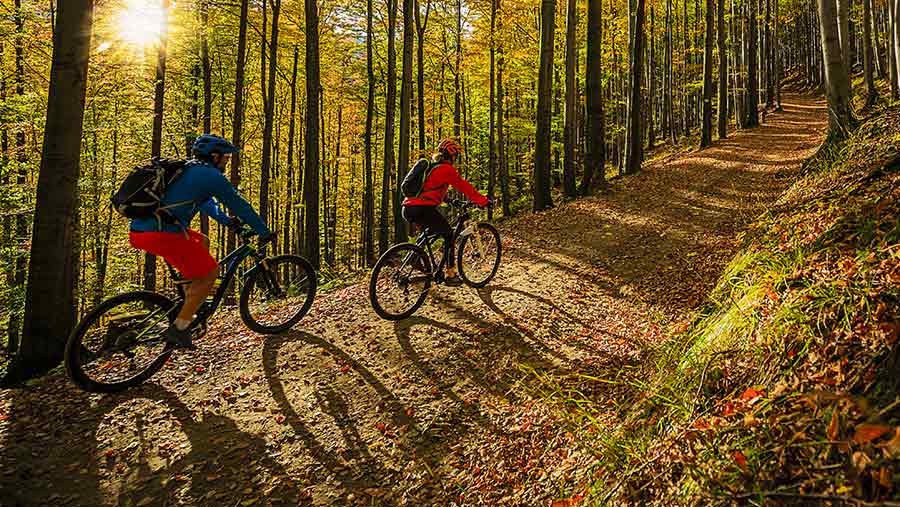Business Clinic: Is mountain bikers’ use of woodland a risk?
 © Adobe Stock
© Adobe Stock Whether it’s a legal, tax, insurance, management or land issue, Farmers Weekly’s experts can help. Here, Ken Kaar of Thrings advises on a landowners’ concerns about use of their woodland by mountain bikers.
Q. Our farmland includes private woodland on the edge of a village. Some locals have been using the woodland as a mountain bike track, going as far as building up mounds of earth for ramps. We do not object to them using the woodland, but are concerned that we may be held liable if one of them were to have an accident. Can you please advise on the legal situation and what steps, if any, we should take.
This is an unusual situation in the rural context, because most landowners will strongly object to the general public using their land in the way you describe. The primary concerns are potential liability for injury to a trespasser and the possibility of creation of rights of way.
Firstly, there are two Occupiers’ Liability Acts, one from 1957 and one from 1984. The 1957 act applies to “visitors” and the 1984 act applies to others – for example, trespassers. If you have control over the state of the land in question, you are the “occupier”.
See also: Has Covid-19 put us in breach of wedding venue contract?
In your case, it sounds like the cyclists are trespassers and that you have not given them permission. An occupier owes a lesser duty of care to trespassers than to visitors.
The duty is to take such care as is reasonable in all the circumstances of the case to see that the trespasser does not suffer injury due to known dangers on the land. There are three elements to this duty of care.
First, do you know of or have reasonable grounds to believe a particular danger exists on your land?
Second, do you know or have reasonable grounds to believe a trespasser will come into contact with that danger?
Finally, in all the circumstances, might you reasonably be expected to offer the trespasser some protection from the danger? If the answer to all of these is yes, then you must take steps to protect the trespasser.
In terms of the steps you must take, this is more difficult to answer because the legislation simply says that you must “take such care as is reasonable in all the circumstances of the case to see that [the trespasser] does not suffer injury on the premises by reason of the danger concerned.”
However, it goes on to say that in “an appropriate case” the duty is discharged by warning trespassers of the danger, provided the warning is specific enough to enable the trespassers to be safe.
Thankfully for landowners, the legislation says no duty is owed if a risk is willingly accepted by the trespasser. The courts have since clarified this by saying that occupiers do not owe a duty to protect trespassers against obvious risks or self-inflicted harm.
In your case, it seems that the activity, cycling through woodland, carries obvious risks and if one of the cyclists fell and injured themselves it could really only be described as self-inflicted.
What many readers will consider to be the more pressing issue upon reading your question is the creation of a right of way.
If the cyclists continue to use the route through your land continuously for 20 years, this can give rise to that route becoming a public right of way for evermore, like a footpath.
To prevent that happening, you can give the cyclists express permission to cross your land. However, if you did that they would no longer be trespassers. They would be your visitors for the purposes of occupiers’ liability and you would therefore owe them a higher duty of care.
It therefore seems that turning a blind eye to this activity and treating the cyclists as trespassers for liability purposes could backfire in the future.
Your better option is either to formalise the cycling route, ensure you have the necessary insurance and take care to maintain the route properly, or prevent the cycling altogether.
Your local authority may agree to entering into a permissive right of way agreement whereby they take responsibility for the route but a public right of way is not created.
If you choose to allow the cycling to continue in future, we would strongly advise that you take specialist advice to ensure you are protected.
Do you have a question for the panel?
Outline your legal, tax, finance, insurance or farm management question in no more than 350 words and Farmers Weekly will put it to a member of the panel. Please give as much information as possible.
Email your question to FW-Businessclinic@markallengroup.com using the subject line “Business Clinic”.

